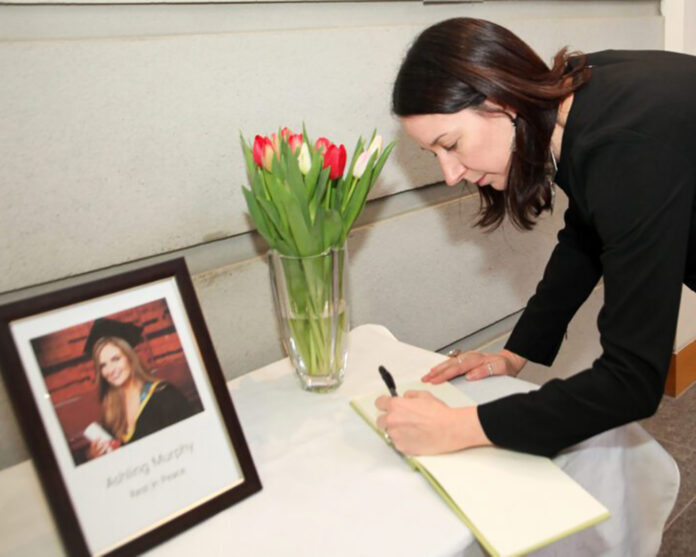
FOLLOWING Joseph Puska’s recent conviction for the murder of Limerick student Ashling Murphy, debate about women feeling unsafe has resurfaced.
Mr Puska’s conviction reopened conversations from when Ms Murphy was killed last year about how many women perceive men in general to be a threat to their safety, particularly when women are alone jogging as Ashling Murphy was when the father of five took her life.
After hearing about Ms Murphy’s death on the news on January 12, 2022, her music lecturer at Mary Immaculate College (MIC), Dr Ailbhe Kenny, decided to go jogging.
“I too am a runner and I thought the best way to think about Ashling, to get some headspace to think about it all and process it, was actually to go for a run,” Dr Kenny explained.
It was her own personal tribute to Ms Murphy, who had graduated from her class three months earlier, as well as to show the perpetrators of violence against women, and the male cat-callers and wolf-whistlers, that they would not stymie her with fear.
There is no one silver-bullet strategy, Dr Kenny said, but changing a “culture of violence against women” should be more of a focus for early educators.
“As a runner, I have been catcalled, whistled at, yelled at, laughed at, pointed at. I haven’t been attacked, but all of these other things have happened to me, and I can guarantee you they happen on a weekly basis to female runner.
“There are women out there running who have fear constantly and who are being subjected to abuse that they shouldn’t be subjected to, and that can act on a continuum from the simple wolf-whistle to someone ending up being murdered.
“It’s about trying to change the culture, these very embedded ideas that females are objects that you can whistle at. I don’t mean to trivialise, but it’s not okay – some people may think it’s a very far cry from murdering a female, but actually it’s not that far away because it’s all on a continuum of abuse of women.
“The more normal that it becomes that women are objectified, and not seen as human beings who are just out for a walk or run and who can be abused in this way or have random acts of violence inflicted on them, the more society accepts that we just continue this perpetual fear amongst women who just want to go out and live their lives to the fullest.”
Dr Kenny and Ms Murphy had shared common bonds, both from County Offaly, both runners, both educators.
“I couldn’t actually believe this could happen to someone so young. A complete senseless act with no apparent connection to any sort of criminality, and it also wasn’t an act of domestic violence that we would hear of much more frequently – it was just so incredibly random and senseless, and that was deeply shocking
“And then, after an hour I decided to put on my trainers and I went for a run,” Dr Kenny told this reporter last year following Ms Murphy’s murder.
Ms Murphy’s murder has made “women stop and think ‘will I go for that walk or run?’ and that was one of the reasons I did go for a run when I found out it was Ashling,” Dr Kenny said.
“We cannot let these violent acts against women restrict our freedom as women, we have to resist the fear, and keep getting out there and claiming our space.”
“We want to be able to walk and run in our communities, I want our female students here in Mary Immaculate College to go out for those runs, whether it’s daylight or nighttime, it shouldn’t matter, and it makes me really upset that that’s now threatened by this kind of act”.
Paying tribute to her former music student, she said: “Ms Murphy had a very bright future ahead of her, she had only just graduated and she has left a huge gap in all our lives.”
“Her leadership qualities were already beginning to shine through, she was already that member of the community that everyone knows.
“She was that person who consistently spread her skills and knowledge, she didn’t keep it to herself, she shared it.”









